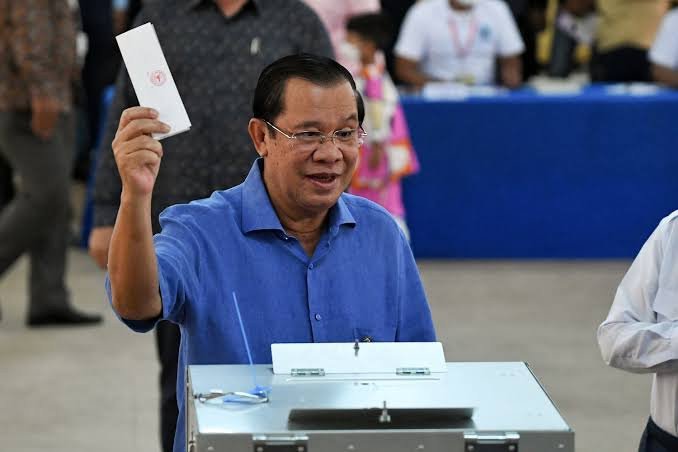Cambodia PM’s son positioned for succession as elections approach

Cambodia’s long-standing leader, Hun Sen, is poised to secure another victory. The 70-year-old prime minister has promised to eventually pass on the reins of power to his eldest son, but has not specified a timeline and has indicated that he intends to maintain influence even after stepping down.
Critics argue that Cambodia’s democracy is in a dire state, with the absence of authentic opposition parties rendering the upcoming vote a sham. Despite these concerns, Hun Sen remains confident about his and his son’s political future. Addressing voters in June, he declared, “Nobody can block the steps forward of Hun Sen or Hun Manet. After Hun Sen, it will be Hun Manet.”
While the succession timeline remains uncertain, Hun Manet, 45, has increasingly taken on campaign responsibilities this year, assuming a symbolic role at a ruling party rally where his father passed the party flag to him. Leading a crowd of supporters through Phnom Penh, Hun Manet has been actively engaged in ceremonies, meetings, and rallies, echoing his father’s message of peace and development.
Human Rights Watch’s Phil Robertson expressed concerns over the prospect of a dynastic transfer of power, drawing parallels between Cambodia and North Korea, suggesting that the country appears more autocratic than genuinely democratic. Hun Sen has assigned political roles to all three of his sons, with Hun Manet assuming the most senior responsibilities. Currently a member of the ruling party’s powerful permanent committee, Hun Manet will be contesting a parliamentary seat for the first time in the upcoming elections.
Hun Manet, who has been the commander of the Royal Cambodian Army since 2018, has met with foreign dignitaries and world leaders, including China’s President Xi Jinping, who is Cambodia’s primary ally and benefactor. Despite his Western education, having studied at the US military academy West Point, exiled politician Sam Rainsy cautioned against assuming a more liberal approach from Hun Manet, citing the example of Syria’s Assad dynasty.
Sebastian Strangio, author of a book on Hun Sen’s rule, remarked that there is currently little evidence to suggest that Hun Manet will introduce significant reforms to the country’s political system. Critics argue that without his father’s support, Hun Manet may lack the ability to effect meaningful change, and his relative lack of political experience adds to this concern.
Hun Sen’s rise to power was shaped by his experiences during the genocidal Khmer Rouge regime, which propelled him into the prime ministership at a young age. Since then, he has consolidated his authority through a combination of co-optation, imprisonment, sidelining, and exile of his opponents. In contrast, Hun Manet was raised in privilege and received an education abroad.
As the elections approach, Cambodia’s political landscape faces a critical juncture. Exiled politician Sam Rainsy contended that without a new leader emerging from outside the Hun family, there is little hope for meaningful change in Cambodia’s autocratic political system.







